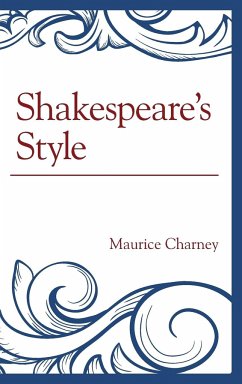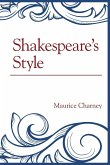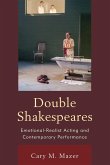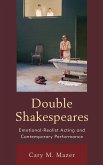Maurice Charney
Shakespeare's Style
Maurice Charney
Shakespeare's Style
- Gebundenes Buch
- Merkliste
- Auf die Merkliste
- Bewerten Bewerten
- Teilen
- Produkt teilen
- Produkterinnerung
- Produkterinnerung
This book presents a detailed consideration of aspects of Shakespeare's writing style in his plays. Each chapter offers a detailed discussion about a single feature of style in a chosen Shakespeare play.
Andere Kunden interessierten sich auch für
![Shakespeare's Style Shakespeare's Style]() Maurice CharneyShakespeare's Style57,99 €
Maurice CharneyShakespeare's Style57,99 €![Double Shakespeares Double Shakespeares]() Cary M. MazerDouble Shakespeares58,99 €
Cary M. MazerDouble Shakespeares58,99 €![Double Shakespeares Double Shakespeares]() Cary M. MazerDouble Shakespeares101,99 €
Cary M. MazerDouble Shakespeares101,99 €![The Text, the Play, and the Globe The Text, the Play, and the Globe]() The Text, the Play, and the Globe132,99 €
The Text, the Play, and the Globe132,99 €![Shakespeare's Dramatic Persons Shakespeare's Dramatic Persons]() Travis CurtrightShakespeare's Dramatic Persons103,99 €
Travis CurtrightShakespeare's Dramatic Persons103,99 €![Shakespeare's Villains Shakespeare's Villains]() Maurice CharneyShakespeare's Villains101,99 €
Maurice CharneyShakespeare's Villains101,99 €![Shakespeare's Villains Shakespeare's Villains]() Maurice CharneyShakespeare's Villains60,99 €
Maurice CharneyShakespeare's Villains60,99 €-
-
-
This book presents a detailed consideration of aspects of Shakespeare's writing style in his plays. Each chapter offers a detailed discussion about a single feature of style in a chosen Shakespeare play.
Produktdetails
- Produktdetails
- Verlag: Fairleigh Dickinson University Press
- Seitenzahl: 206
- Erscheinungstermin: 20. August 2014
- Englisch
- Abmessung: 235mm x 157mm x 17mm
- Gewicht: 493g
- ISBN-13: 9781611477641
- ISBN-10: 1611477646
- Artikelnr.: 41125507
- Herstellerkennzeichnung
- Libri GmbH
- Europaallee 1
- 36244 Bad Hersfeld
- gpsr@libri.de
- Verlag: Fairleigh Dickinson University Press
- Seitenzahl: 206
- Erscheinungstermin: 20. August 2014
- Englisch
- Abmessung: 235mm x 157mm x 17mm
- Gewicht: 493g
- ISBN-13: 9781611477641
- ISBN-10: 1611477646
- Artikelnr.: 41125507
- Herstellerkennzeichnung
- Libri GmbH
- Europaallee 1
- 36244 Bad Hersfeld
- gpsr@libri.de
Maurice Charney is retired from Rutgers University as a distinguished professor and was president of both the Shakespeare Association of America and the Academy of Literary Studies.
Contents Introduction 1. Antipholus of Syracuse as Comic Hero in The Comedy
of Errors 2. The Satire on Learning in Love's Labor's Lost 3. Richard's
Physical Deformities in 3 Henry VI and Richard III 4. The Sardonic Aaron in
Titus Andronicus 5. Who Tames Whom in The Taming of the Shrew? 6. The
Conventions of Romantic Love in The Two Gentlemen of Verona 7. The
Portentous Tragedy of Romeo and Juliet 8. Audience Response to Richard in
Richard II 9. The Fairy World of A Midsummer Night's Dream 10. Shylock's
Monomaniacal Style in The Merchant of Venice 11. Commodity and the Bastard
in King John 12. Falstaff's Hyperbole in the Henry IV Plays 13. The
Banishment of Falstaff in the Henry IV Plays 14. Shakespeare's Illiterates
15. The Wit Combat of Beatrice and Benedick in Much Ado About Nothing 16.
The Roman Style of Julius Caesar 17. Jaques as Satiric Observer in As You
Like It 18. Feste as Corrupter of Words in Twelfth Night 19. Hamlet as
Actor 20. Sex Nausea in Troilus and Cressida 21. Parolles the Braggart in
All's Well That Ends Well 22. Iago's and Othello's "Ha's" 23. Lucio the
Calumniator in Measure for Measure 24. Madness in King Lear 25. The
Macbeths's Insomnia 26. Roman Values in Antony and Cleopatra 27. The
Cultivation of Excess in Timon of Athens 28. Coriolanus's Manliness 29. The
Saintly Marina in Pericles 30. Imogen: Romance Heroine of Cymbeline 31.
Speech Rhythms in The Winter's Tale 32. Prospero's "Art" in The Tempest 33.
The Tragedy of Cardinal Wolsey in Henry VIII 34. The Pretty Madness of the
Jailer's Daughter in The Two Noble Kinsmen Conclusion
of Errors 2. The Satire on Learning in Love's Labor's Lost 3. Richard's
Physical Deformities in 3 Henry VI and Richard III 4. The Sardonic Aaron in
Titus Andronicus 5. Who Tames Whom in The Taming of the Shrew? 6. The
Conventions of Romantic Love in The Two Gentlemen of Verona 7. The
Portentous Tragedy of Romeo and Juliet 8. Audience Response to Richard in
Richard II 9. The Fairy World of A Midsummer Night's Dream 10. Shylock's
Monomaniacal Style in The Merchant of Venice 11. Commodity and the Bastard
in King John 12. Falstaff's Hyperbole in the Henry IV Plays 13. The
Banishment of Falstaff in the Henry IV Plays 14. Shakespeare's Illiterates
15. The Wit Combat of Beatrice and Benedick in Much Ado About Nothing 16.
The Roman Style of Julius Caesar 17. Jaques as Satiric Observer in As You
Like It 18. Feste as Corrupter of Words in Twelfth Night 19. Hamlet as
Actor 20. Sex Nausea in Troilus and Cressida 21. Parolles the Braggart in
All's Well That Ends Well 22. Iago's and Othello's "Ha's" 23. Lucio the
Calumniator in Measure for Measure 24. Madness in King Lear 25. The
Macbeths's Insomnia 26. Roman Values in Antony and Cleopatra 27. The
Cultivation of Excess in Timon of Athens 28. Coriolanus's Manliness 29. The
Saintly Marina in Pericles 30. Imogen: Romance Heroine of Cymbeline 31.
Speech Rhythms in The Winter's Tale 32. Prospero's "Art" in The Tempest 33.
The Tragedy of Cardinal Wolsey in Henry VIII 34. The Pretty Madness of the
Jailer's Daughter in The Two Noble Kinsmen Conclusion
Contents Introduction 1. Antipholus of Syracuse as Comic Hero in The Comedy
of Errors 2. The Satire on Learning in Love's Labor's Lost 3. Richard's
Physical Deformities in 3 Henry VI and Richard III 4. The Sardonic Aaron in
Titus Andronicus 5. Who Tames Whom in The Taming of the Shrew? 6. The
Conventions of Romantic Love in The Two Gentlemen of Verona 7. The
Portentous Tragedy of Romeo and Juliet 8. Audience Response to Richard in
Richard II 9. The Fairy World of A Midsummer Night's Dream 10. Shylock's
Monomaniacal Style in The Merchant of Venice 11. Commodity and the Bastard
in King John 12. Falstaff's Hyperbole in the Henry IV Plays 13. The
Banishment of Falstaff in the Henry IV Plays 14. Shakespeare's Illiterates
15. The Wit Combat of Beatrice and Benedick in Much Ado About Nothing 16.
The Roman Style of Julius Caesar 17. Jaques as Satiric Observer in As You
Like It 18. Feste as Corrupter of Words in Twelfth Night 19. Hamlet as
Actor 20. Sex Nausea in Troilus and Cressida 21. Parolles the Braggart in
All's Well That Ends Well 22. Iago's and Othello's "Ha's" 23. Lucio the
Calumniator in Measure for Measure 24. Madness in King Lear 25. The
Macbeths's Insomnia 26. Roman Values in Antony and Cleopatra 27. The
Cultivation of Excess in Timon of Athens 28. Coriolanus's Manliness 29. The
Saintly Marina in Pericles 30. Imogen: Romance Heroine of Cymbeline 31.
Speech Rhythms in The Winter's Tale 32. Prospero's "Art" in The Tempest 33.
The Tragedy of Cardinal Wolsey in Henry VIII 34. The Pretty Madness of the
Jailer's Daughter in The Two Noble Kinsmen Conclusion
of Errors 2. The Satire on Learning in Love's Labor's Lost 3. Richard's
Physical Deformities in 3 Henry VI and Richard III 4. The Sardonic Aaron in
Titus Andronicus 5. Who Tames Whom in The Taming of the Shrew? 6. The
Conventions of Romantic Love in The Two Gentlemen of Verona 7. The
Portentous Tragedy of Romeo and Juliet 8. Audience Response to Richard in
Richard II 9. The Fairy World of A Midsummer Night's Dream 10. Shylock's
Monomaniacal Style in The Merchant of Venice 11. Commodity and the Bastard
in King John 12. Falstaff's Hyperbole in the Henry IV Plays 13. The
Banishment of Falstaff in the Henry IV Plays 14. Shakespeare's Illiterates
15. The Wit Combat of Beatrice and Benedick in Much Ado About Nothing 16.
The Roman Style of Julius Caesar 17. Jaques as Satiric Observer in As You
Like It 18. Feste as Corrupter of Words in Twelfth Night 19. Hamlet as
Actor 20. Sex Nausea in Troilus and Cressida 21. Parolles the Braggart in
All's Well That Ends Well 22. Iago's and Othello's "Ha's" 23. Lucio the
Calumniator in Measure for Measure 24. Madness in King Lear 25. The
Macbeths's Insomnia 26. Roman Values in Antony and Cleopatra 27. The
Cultivation of Excess in Timon of Athens 28. Coriolanus's Manliness 29. The
Saintly Marina in Pericles 30. Imogen: Romance Heroine of Cymbeline 31.
Speech Rhythms in The Winter's Tale 32. Prospero's "Art" in The Tempest 33.
The Tragedy of Cardinal Wolsey in Henry VIII 34. The Pretty Madness of the
Jailer's Daughter in The Two Noble Kinsmen Conclusion









